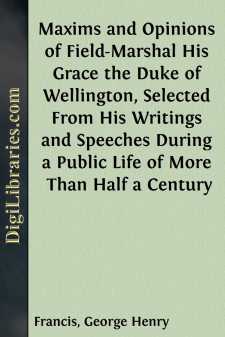Categories
- Antiques & Collectibles 13
- Architecture 36
- Art 48
- Bibles 22
- Biography & Autobiography 813
- Body, Mind & Spirit 142
- Business & Economics 28
- Children's Books 15
- Children's Fiction 12
- Computers 4
- Cooking 94
- Crafts & Hobbies 4
- Drama 346
- Education 46
- Family & Relationships 57
- Fiction 11828
- Games 19
- Gardening 17
- Health & Fitness 34
- History 1377
- House & Home 1
- Humor 147
- Juvenile Fiction 1873
- Juvenile Nonfiction 202
- Language Arts & Disciplines 88
- Law 16
- Literary Collections 686
- Literary Criticism 179
- Mathematics 13
- Medical 41
- Music 40
- Nature 179
- Non-Classifiable 1768
- Performing Arts 7
- Periodicals 1453
- Philosophy 64
- Photography 2
- Poetry 896
- Political Science 203
- Psychology 42
- Reference 154
- Religion 513
- Science 126
- Self-Help 84
- Social Science 81
- Sports & Recreation 34
- Study Aids 3
- Technology & Engineering 59
- Transportation 23
- Travel 463
- True Crime 29
Maxims and Opinions of Field-Marshal His Grace the Duke of Wellington, Selected From His Writings and Speeches During a Public Life of More Than Half a Century
Categories:
Description:
Excerpt
MEMOIR
OF
HIS GRACE THE DUKE OF WELLINGTON.
Arthur Wellesley, Duke of Wellington, is the fourth son of Garret,
second Earl of Mornington, by Anne, the eldest daughter of Arthur Hill,
Viscount Dungannon. He was borne at Dangan Castle, in the county of
Meath, Ireland, on the 1st of May, 1769.
As in the case of many of the chief nobility and landholders in Ireland, the ancestors of the Duke were scions of an English house—the Colleys (afterwards Cowley), two of whom, named Walter and Robert Colley, proceeded to Ireland in the reign of Henry VIII., and located themselves in the County of Kilkenny. The two brothers were lawyers by profession, and in the year 1531, were invested with the office of Clerk of the Crown in Chancery, which they were to hold jointly during their lives. Six years afterwards, we find the elder brother Master of the Rolls in Ireland, and the other Solicitor-General. In 1549, Walter was made Surveyor-General of Ireland. It was from this Walter that the immediate ancestors of the Duke of Wellington were, by the mother's side, descended.
His eldest son, Henry, acquired some distinction as a soldier in the reign of Elizabeth. He was also a member of the Irish Parliament for the borough of Thomastown. He was, moreover, a Privy Councillor, and was knighted.
Sir Henry Sydney, who was, perhaps, the wisest and most able of all the Lords Deputy whom Elizabeth sent over to Ireland, appears to have entertained a very high opinion of Sir Henry Colley's abilities; for, in recommending him to his successor in the Government, he describes him as "valiant, fortunate, and a good servant;" and speaks of him as his "sound and fast friend." But he more especially praises the "order," in which he kept his county.
Thus early did a member of this family earn praise for good service to the State; and if we compare the measure of that praise with what we know of the temper of the times, we might almost suppose that some portion of the spirit of the "sound and fast friend," the "valiant, fortunate, and good servant," had been inherited by his illustrious descendant.
The immediate descendants of Sir Henry Colley were more or less distinguished. His great-great grand-daughter, Elizabeth, married into the family of the Westleys (afterwards Wellesleys) of Dangan, in the county of Meath. This family also was of English extraction, having originally come from Sussex. Richard Colley, the nephew of the Elizabeth abovementioned, was adopted by Garret Wellesley, whose name and estates he took in the year 1728, by patent from the Herald's office. He was auditor and registrar of the Royal Hospital of Kilmainham, and a Chamberlain of the Court of Exchequer. He sat in parliament several years for Carysford, and was, in 1747 raised to the peerage by George II., being created Baron Mornington. His son, Garret, was, in 1760, created Viscount Wellesley and Earl of Mornington. He married, on the 6th February, 1759, Anne, eldest daughter of the Right Honourable Arthur Hill, Viscount Dungannon, by whom he had issue, Richard the late Marquis Wellesley, Arthur Gerald, who died in infancy, William Wellesley Pole, Baron Maryborough, Arthur Duke of Wellington, Gerald Valerian, D.D., Sir Henry, G.C.B., Francis Seymour, Anne, and Mary Elizabeth....


